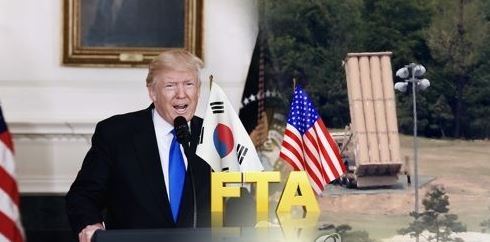The United States' trade deficit with Korea is not a result of their bilateral free trade agreement, two experts here have said, dismissing President Donald Trump's push to revise the deal.
Gary Hufbauer, a senior fellow at the Peterson Institute for International Economics, and Euijin Jung, a research analyst at the same institution, made the case in a contribution to The Hill last week, saying it "makes no sense" to try to modify the FTA now.
"Trump sees US bilateral trade deficits as prima facie evidence of unfair trade," they wrote. "Trump also believes that the absence of 'mirror image reciprocity' furnishes additional evidence of unfair trade -- in other words, higher foreign barriers on US exports of a specific product than US barriers on imports of the same product. Applying these tests, Trump tosses the Korea-US Free Trade Agreement (KORUS FTA) into the basket of unfair deals, alongside NAFTA (North American Free Trade Agreement)."
 |
(Yonhap) |
However, trade imbalances are caused by fiscal imbalances and the exchange rate, not free trade agreements, they said. When assessing the success of the KORUS FTA under the "right" criteria -- expansion in two-way goods and services trade and induced expansion in two-way foreign direct investment -- the deal is a "great success," they argued.
According to data provided by the authors, two-way trade in goods and services increased from US$129 billion in 2011 to $145 billion last year. Two-way investment also increased from $48 billion in 2011 to $74 billion in 2015.
The painstakingly negotiated KORUS FTA has been in effect since 2012 and has widely been considered a symbol of the economic alliance between the two countries.
But Trump has long vowed to revise the pact, calling it a "job killing" deal and a "disaster."
"Foreign direct investment in the United States by Korean firms had already created about 45,000 jobs by 2014 (based on Korean data)," according to the experts. "For example, Korean automakers Hyundai and Kia operated their manufacturing plants in Alabama and Georgia with a complement of 6,700 workers in 2015."
Earlier this month the Trump administration began a process to renegotiate the deal. In a letter to his Korean counterpart, US Trade Representative Robert Lighthizer requested a joint session in Washington next month to consider possible amendments and modifications.
The White House later cited that as one of the accomplishments during Trump's first six months in office.
"The Trump administration already has its hands full with NAFTA modernization," the experts said. "It makes no sense to re-open the KORUS FTA until NAFTA talks outline the shape of the new US template for trade agreements. That probably won't happen before 2018."
In the meantime, Korea and the US should work to dismantle remaining barriers to two-way trade and investment, they said. (Yonhap)








